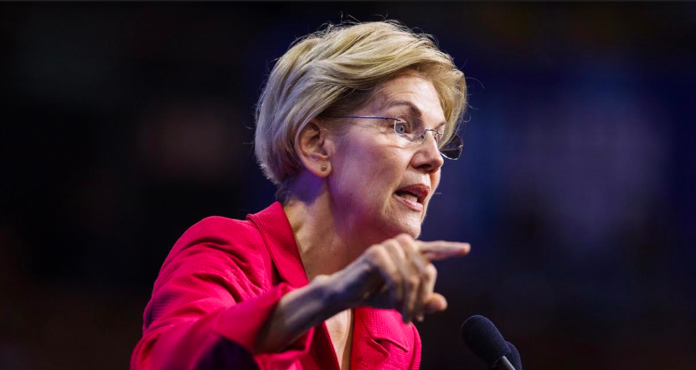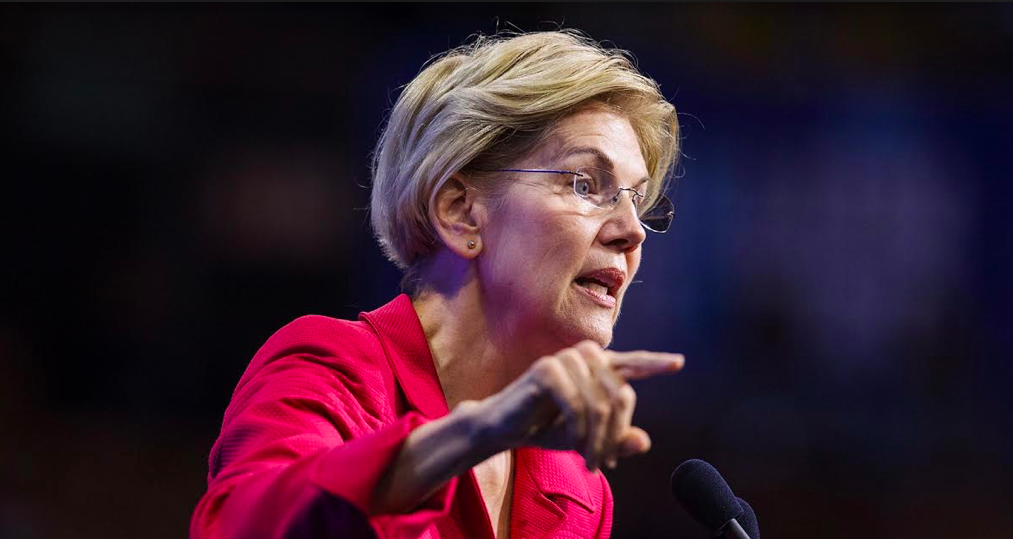
I read The New York Times every day. I know people who have worked for the paper, and most of them are experienced professionals who try really hard to get the facts right.
But like a lot of mainstream new media, The Times has deeply baked-in assumptions that shape its coverage. And when its political and economic policy reporters try to write about the complicated economic questions raised by the Elizabeth Warren and Bernie Sanders tax plans, you can see the institutional bias of the paper emerging.

In the case of this story, it’s almost laughable.
Let’s take a look. Here’s the headline and subhed:
Democrats’ Plans to Tax Wealth Would Reshape U.S. Economy
Proposals from Elizabeth Warren and Bernie Sanders have raised concerns from economists and business leaders who fear the plans would sap economic growth.
Okay – the tax plans would indeed have an impact on the economy. But when you say the plans have “raised concerns from economists and business leaders who fear the plans would sap economic growth,” you are making a point (that economists are worried) and an assumption (that it’s a bad thing to “sap economic growth.”)
Let’s start with the first point. When you talk about “economists” in the United States, you are talking about a group of people who fall, by and large, somewhere on the spectrum between neo-liberal and conservative. Perhaps because of their training, most academic and business economists believe that free markets are the best way to establish prices and allocate resources. Survey economists and the vast majority will say, for example, that rent control is bad.That’s because rent control distorts markets.
The fact that rent control saves the homes of vast numbers of tenants and creates some degree of stability in communities doesn’t matter. That’s not how most economists in this country think.
There are, of course, a few distinguished economists who don’t think that way. But they are a minority.
Help us save local journalism!
Every tax-deductible donation helps us grow to cover the issues that mean the most to our community. Become a 48 Hills Hero and support the only daily progressive news source in the Bay Area.
And when you talk about “business leaders” these days, you are talking about people who are almost always in the top one percent – the people who would have to pay the Warren or Sanders wealth tax.
Consider:
The wealth taxes under discussion would deal a major blow to the balance sheets of American plutocrats like Jeff Bezos, Bill Gates and Warren Buffett. If the tax that Ms. Warren has called for had been in place since 1982, the net worth of the 15 richest Americans in 2018 would have been half as much, according to two economists who helped develop her plan. The Sanders wealth tax, which was released last week, would have eroded their fortunes even further, to barely one-fifth of their 2018 total.
Read that paragraph a couple of times; it took me a while to figure it out. What the reporters are doing is setting the tax as if it were in place 37 years ago. They are saying, in essence, that if the Sanders tax plan took effect today, then 37 years from now, the total wealth of Bill Gates, Jeff Bezos, and Warren Buffet would decline by 80 percent.
Which means that those three men, most of who would be dead by then so we are talking about their estates, would be left with a mere $22 billion or so. (I am not adjusting for inflation; the real number would no doubt be much higher.) Their great-grandkids would still never have to work.
This is a bad thing? This is something to worry about?
In fact, three years before 1982, the top tax bracket on the income levels that those three have achieved was above 70 percent. If the tax policies of such radicals as Harry Truman, Dwight Eisenhower, and Richard Nixon were in place over the past 37 years, the level of income and wealth inequality we are seeing today wouldn’t be possible.
Oh, and by the way: Most US cities rely on property taxes, which are a well-established way to raise money. What’s the different between taxing real estate and taking stock portfolios, yachts, and jewelry? Not much.
Let’s continue.
But the idea of redistributing wealth by targeting billionaires is stirring fierce debates at the highest ranks of academia and business, with opponents arguing it would cripple economic growth, sap the motivation of entrepreneurs who aspire to be multimillionaires and set off a search for loopholes.
So: We are supposedly seeing “fierce debates” at the “highest ranks” of academia and business. These distinguished critics are arguing, apparently, that Bill Gates would never have started Microsoft if he knew he would only wind up with $22 billion 37 years later. Seriously?
And who are these top-level economists and business leaders? The story quotes exactly three:
Donald Trump’s treasury secretary.
A very conservative Harvard economist who was on GW Bush’s Council of Economic Advisors.
And the CEO of JP Morgan.
It gets worse:
Left-leaning economists have expressed their own doubts about a wealth tax. Earlier this year, Lawrence Summers, who was President Bill Clinton’s Treasury secretary, warned in an article with Natasha Sarin, a law professor at the University of Pennsylvania, that wealth taxes would sap innovation by putting new burdens on entrepreneurial businesses while they are starting up. In their view, a country with more millionaires is a sign of economic vibrancy.
Um, excuse me. Larry Summers is not, by any coherent, rational definition, a “left-leaning economist.” He’s a neo-liberal at best, a former president of Harvard who was ousted after he said that the reason there aren’t as many women in science and technology is that they don’t have the aptitude.
There are, in fact, left-leaning economists in the world. As far as I know, every one of them supports the Warren-Sanders approach. Thomas Picketty, who is the most important economist since Marx and Keynes, argues that only a wealth tax can prevent a massive economic meltdown that will threaten civilization.
Then we have the deep assumption that The Times never questions: the idea that economic growth is always good, an infallible goal.
It’s not.
A growing number of environmentalists are questioning whether the planet can survive if the “economy” continues to grow – which requires removing increasing resources from the planet. (It also requires increased “productivity,” which means technology taking away human jobs, which our society is utterly unprepared to address.)
Sim Van Der Ryn, the legendary architect and planner, once asked me why “we have to have a perpetually adolescent economy.” It’s a good question – particularly since environmental sustainability will in the end require economic sustainability.
That’s scary to the one percent. Because the prevailing narrative in this country has always been expanding the economic pie – it was JFK who said that “a rising tide lifts all boats.” If you stop talking about growing the pie, you have to start talking about redistributing it.
Those questions don’t appear in The New York Times. Instead, the paper is instilling fear in those who worry that the end of “growth” might mean the end of their jobs.
Again: wrong. Take billions from the very rich and redistribute it through government, and you create more jobs (decent jobs with benefits).
I read The New York Times every day. But sometimes it drives me crazy.

